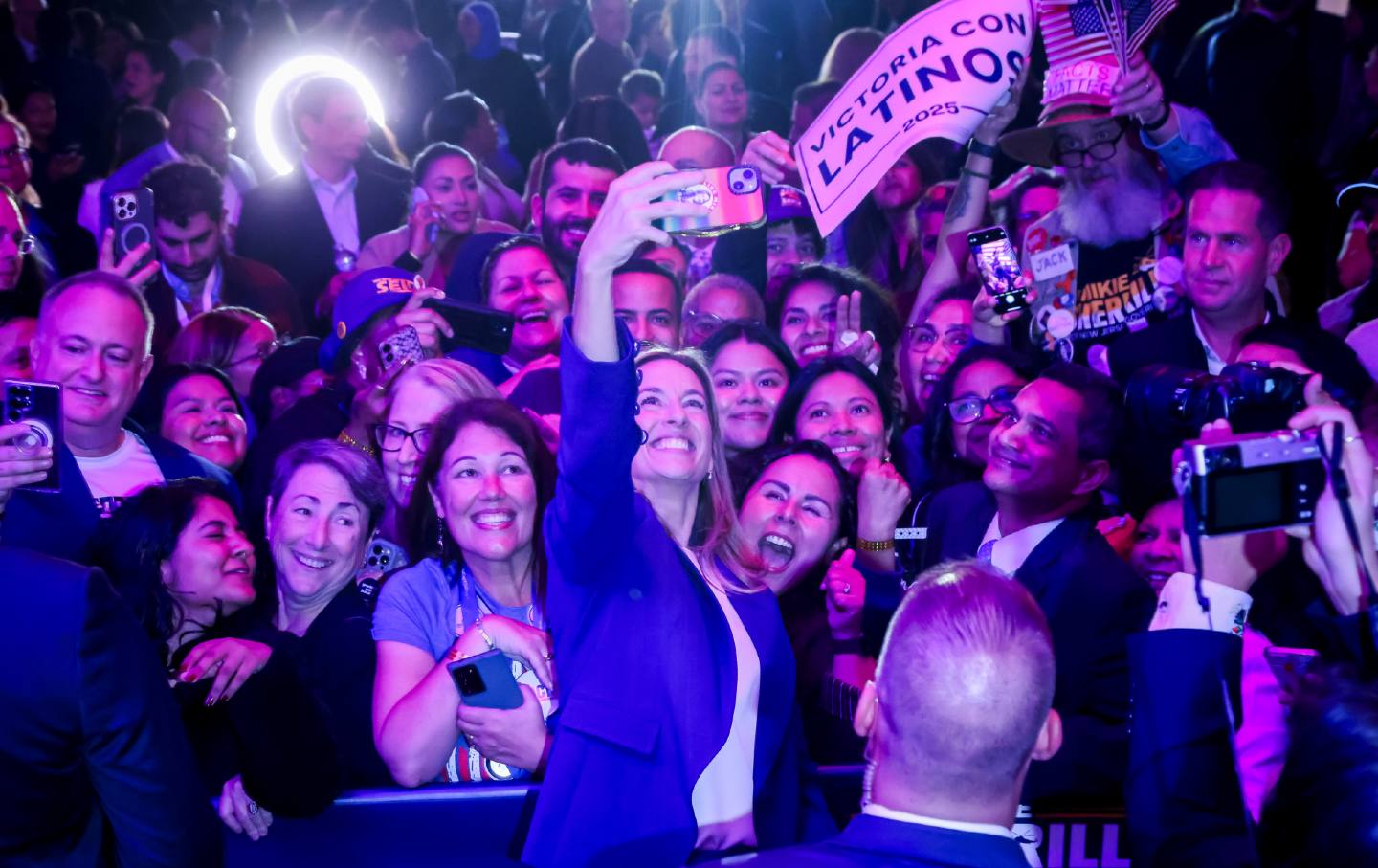She had her flaws, but the 38-year House veteran was the most productive progressive leader of my lifetime.

House Speaker Emerita Nancy Pelosi in 2020.
(Tom Williams / AP Images)
House Speaker Emerita Nancy Pelosi announced Thursday that she won’t seek reelection in 2026. I am grateful to her for that—she’s 85, it’s time—but I’m not someone who is celebrating the news. I’m wistful about it. She had her flaws, but the 38-year House veteran was the most productive progressive leader of my lifetime. Some would deny her the label progressive, but her combination of solid liberal values and unrivalled legislative skill meant she got more meaningful progressive legislation passed than any Democrat since Lyndon Johnson. There would be no Affordable Care Act without her, and the parts of his ambitious domestic agenda President Joe Biden was able to get passed—however scaled down by faux Democrats Krysten Sinema and Joe Manchin in the Senate— would not have passed without her, either.
Don’t believe me: Representative Pramila Jayapal, chair emerita of the Congressional Progressive Caucus, posted on X upon hearing the news:
Speaker Emerita Pelosi has been the most effective Speaker in a generation—delivering time & again for the American people & showing true, principled leadership. It has been my honor to serve with her & I thank her for her work to make America a more just & fair place for us all.
Pelosi was my congressional representative in San Francisco for 25 years, and I was proud to vote for her many times. But I didn’t vote for her when she first ran for office in 1987; I voted for Democratic Socialists of America leader Harry Britt. I had met Pelosi several times, first when she chaired the California Democratic Party and came to Santa Barbara, where I had my first job out of college, for a tea with wealthy ladies in tony Montecito. Like the AIDS activist Cleve Jones, who confessed to The New York Times that he viewed her mainly as “a society lady,” I underestimated the beautifully coiffed woman in pearls, designer suits, and stilettos. Also in 1987, she came to rally Art Agnos supporters before a day of door-knocking for the progressive San Francisco mayor, and I was underwhelmed by her oratory (she was never the best public speaker, which she knew). On that occasion, she was dressed down, in blue jeans—but designer blue jeans.
Hey, women can be sexist too, I learned over time.
But when she got to Congress, she became a fierce advocate for AIDS funding in the face of Ronald Reagan’s not-so-benign neglect, and she won me over. She climbed up through the leadership and helped mastermind the Democrats’ House and Senate takeovers in 2006, crusading against President Bush’s unpopular Iraq war, which she had opposed. And when she took the speaker’s gavel in 2007, she did it surrounded by her children and grandchildren. “For our daughters and our granddaughters, we are finally breaking the marble ceiling,” she declared.
Pelosi was a bit of a throwback in always leading with her experience as a mother as her main credential for being a Democratic leader. At one point in my life, I thought it playing to female stereotypes; later, I would see it as women of a certain age proudly claiming their entire life span. She waited until her five children were grown before entering electoral politics, a privilege afforded her by her wealthy husband, Paul, but a choice that deserved respect nonetheless. When then–NBC journalist Luke Russert rather callously asked her in 2013 whether her decision to run for speaker again “prohibits the party from having a younger leadership,” she schooled him on how ageism can be a kind of sexism.
His comment was “offensive,” she said, “but you probably don’t realize it.” She went on:
“I came to Congress when my youngest child, Alexandra, was a senior in high school and practically on her way to college. I knew that my male colleagues had come when they were 30. They had a jump on me because they didn’t have to…stay home [with children]. Now, I did what I wanted to do, I was blessed to have that opportunity to sequentially raise my family and then come to Congress.… You’ve got to take off 14 years for me because I was home raising a family, getting the best experience of all in diplomacy, interpersonal skills.
“No, the answer is no.”
The women surrounding Pelosi cheered, and so did I, to be honest. To this day, even progressive women with supportive partners find themselves compromising their career goals when their children are young, and Pelosi was right to claim that gave many of us a different timeline to fulfill our dreams (plus, we live longer and stay more vibrant in aging than men do; I’d take the 85-year-old Pelosi as president over the 79-year-old Donald Trump any day of the week).
Few people remember this—I hold long grudges—but Pelosi also tried to check President Obama’s congenital, self-regarding bipartisanship early in his presidency. Remember, in 2008 he campaigned on creating “Obamacans,” Republicans who would support our triangulating first Black president; instead, he got the racist, reactionary Tea Party that gave birth to birther Donald Trump’s presidency. No, I don’t blame Obama for the racism he endured, but I do think he took too long to realize what he was up against.
In The New York Times, Matt Bai revealed in 2010 that Team Obama was focussed on burnishing his “brand,” which they allegedly believed meant “inclusivity, transcendence, a generational break from stale dogmas” while Pelosi excoriated them, mostly privately, for railing against “Washington” and “gridlock” without ever mentioning that the agents of opposition to his agenda were Republicans. She felt he was helping create a backlash to the congressional Democrats who supported him, and I agreed with her.
But she could also criticize herself for empowering Republicans, too. In an interview I did during the 2013 government shutdown, she blamed herself and other Democratic leaders for enabling Republican extremism by caving to them in earlier standoffs.
“At some point, could being the ‘responsible’ party actually be irresponsible, because it keeps them coming back and asking for more?” I asked her.
“That’s exactly right,” she replied. “We’re enablers. We’ve become enablers. We can’t be that anymore.”
Pelosi was also the master of the sly symbolic gesture. Offering Trump a dramatically fake clap at one State of the Union, tearing up his lie-filled speech at another. That joyous burnt-orange Max Mara coat she rocked after confronting Trump in the White House in 2018 gave me life. Was she deliberately tweaking him, showing that at least one of them could wear orange beautifully?
OK, she was wearing a designer coat that, when Max Mara reintroduced it thanks to her making it so famous, I couldn’t afford (I actually looked). Granted, she was not always the best populist symbol. Likewise, when she showed reporters her $24,000 Sub-Zero freezers stocked with fancy chocolate ice cream during the pandemic. It wasn’t entirely sexism that led Republicans to try to make her the face of an “elitist” party.
Popular
“swipe left below to view more authors”Swipe →
And she made her share of mistakes, mainly by supporting centrist, even conservative Democratic incumbents over younger, progressive insurgents (indicted anti-choice Democrat Henry Cuellar thanks her for his continued service). She helped block Representative Alexandria Ocasio-Cortez from becoming the ranking Democrat on the House Oversight Committee, favoring Virginia veteran Gerry Connolly, who sadly died in office. In my opinion, Pelosi has not done enough to cultivate and elevate progressive members, from AOC to former representative Katie Porter, now running for California governor.
She was too cautious with both Trump impeachments, slow-walking them; had she moved more quickly in January 2021, when even Trump lickspittles like former Speaker Kevin McCarthy and former Senate majority leader Mitch McConnell were blaming the crazed, defeated guy for threatening their lives, the Senate might have convicted him. And Pelosi supported current minority leader Hakeem Jeffries in his leadership rise over the great Barbara Lee, now Oakland mayor. She then anointed Jeffries as her successor, and he has not, so far, turned out to be the Defiance Leader many of us hoped he’d be in this terrible second term of Trump. Let’s hope if he gets the speaker’s gavel in 2027, he’ll be more like Pelosi.
Even as it’s been widely rumored that she’s retiring, she’s become the poster girl for the Democratic gerontocracy, until today. I think that’s a tiny bit unfair—see above—but I get it. My friend Rebecca Traister has a wonderful piece on the gerontocracy in the current New York magazine, in which she lauds older Democrats like Minnesota Senator Tina Smith and former House representatives Susan Wild of Pennsylvania and Annie Kuster of New Hampshire for stepping down. Pelosi’s move came too late: she is the center square in the magazine’s Hollywood Squares illustration of elderly Dems. But at least she got it, unlike her late San Francisco colleague, Senator Dianne Feinstein, who died, in semi-ignominy, in office at 95.
Predictably, Donald Trump had high praise for Pelosi upon learning about her decision. “The retirement of Nancy Pelosi is a great thing for America,” he said on Thursday in a response to Fox News. “She was evil, corrupt, and only focused on bad things for our country.” My new favorite Republican, Marjorie Taylor Greene, did in fact laud Pelosi. “I will praise Nancy Pelosi. She had an incredible career. I served under her speakership in my first term of Congress. And I’m very impressed at her ability to get things done. I wish we could get things done for our party.” Well, I don’t wish that, exactly, but I get her point.
The race to succeed her will be crowded. It already includes State Senator Scott Wiener and former AOC chief of staff Saikat Chakrabarti. But Pelosi said she remains undaunted. She recently told CNN she had “no doubt that if I decided to run, I would win.” She added, “It isn’t arrogant. It’s confident.” I believe she is right, but I’m glad she’s retiring anyway.
More from The Nation

Despite the attempts by so many in the party’s establishment to paint trans rights as a toxic issue, transphobia was soundly rejected across the country this week.

There were no bright spots for the GOP this election. Across the country, Democrats running on inclusionary, economically ambitious, pro-immigrant policies won.

Holding political office is not the same as wielding political power—especially for the left. To win bold demands, social movements must go on the offensive.



